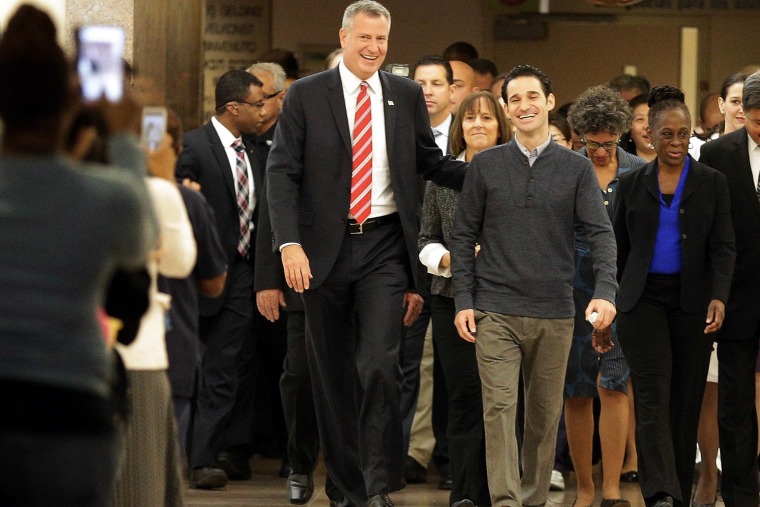The last American patient infected with Ebola, Dr. Craig Spencer, was released from Bellevue Hospital Tuesday after being cleared of the deadly virus in New York City.
"Today I am healthy and no longer infectious," Spencer said at press conference at the hospital. He thanked his doctors, the aid group Doctors Without Borders and his employer for their support and understanding as he volunteered in Guinea to combat Ebola.
RELATED: Ebola czar says 'today is a milestone'
Now, Spencer said, it's time to focus on West Africa, the epicenter of the outbreak. "My infection represents but a fraction of the more than 13,000 cases reported in Africa, the center of the outbreak where families are torn apart and communities destroyed," Spencer said. "Please join me in turning our attention back to West Africa."
Spencer said that during his treatment in New York, his former patients in Guinea -- Ebola survivors -- reached out. "Many of these patients called from Guinea to ask if there was any way they could contribute to my care," he said, and reminded the media of the doctors who have been fighting Ebola since the start of the outbreak earlier this year. "They are the true heroes that we are not talking about," he said.
Spencer was diagnosed with Ebola in October, after returning from volunteer work in Guinea with Doctors Without Borders. Seventy percent of patients treated for Ebola in Africa die. Eight out of nine patients treated in the U.S. have survived.
New York Mayor Bill de Blasio called Spencer a "hero" and an "inspiration." "It's a good feeling to hug a hero," he said after embracing Spencer in what de Blasio called "the official mayoral hug."
Officials reiterated that Spencer followed protective protocols completely and that those protocols worked, a nod to the criticism he received upon his diagnoses, because he had spent the previous day coming down with a fever—typically the first symptom of Ebola—and taking public transportation and going bowling. His fiancé, Morgan Dixon, will remain under a voluntary quarantine for an additional three days. Two friends are being directly monitored by officials; the 100 individuals who were involved in his care are actively monitoring themselves for symptoms.
Photo essay: Ebola continues its deadly march
Spencer's only risk factor? Sex. Ebola survivors can transmit the disease through semen for up to 90 days.
Still, officials reiterated that today was a "day of celebration."
"Today is proof that proper preparedness and erring on the side of caution can save lives. On behalf of all New Yorkers, I am greatly relieved to hear of Dr. Spencer's recovery and thank him for his important and heroic work on the front lines of this devastating epidemic in West Africa," Gov. Andrew Cuomo said in a statement.
Meanwhile in Maine, nurse Kaci Hickox, who recently treated Ebola patients in Sierra Leone, will see her high-profile monitoring and restrictions lifted in Fort Kent.
Hickox's ordeal made headlines: she was first quarantined in New Jersey, on her way home from Africa, where she’d been treating Ebola patients through Doctors Without Borders. She was healthy—and hasn’t yet developed Ebola and has just hours left on her quarantine in which she could possibly do so—and threatened to sue New Jersey for forcibly quarantining her in a tent in a parking lot outside a Newark hospital.
Related: Nurse Kaci Hickox: ‘I will go to court to fight for my freedom’
They transferred her to Maine, where state officials fought to have her legally compelled into an in-home quarantine. Hickox flouted her quarantine and a judge eventually lifted the strictest restrictions the state had tried to impose, instead asking her to avoid crowded places, not take public transportation, and submit to direct monitoring during the 21-day period in which Ebola can incubate in a human body.
“We are leaving Fort Kent because our purpose of being here was Ted attending nursing school at UMFK [University of Maine Fort Kent] and he will not continue at an institution of higher learning that has acted so poorly, shown no leadership, and completely disregarding him during the past few weeks,” Hickox wrote in a message to NBC News on Monday.
Ted Wilbur—Hickox’s boyfriend—formally withdrew from his nursing program last week. He told NBC News on Tuesday that his tuition had been refunded.
The school said they “regretted” his departure and said there were student concerns about his return to the program before Hickox’s 21-day incubation period was completed, though they admitted he was not a health risk. Ebola is only transmittable from the body fluids of a symptomatic person and simply living with a person who has been exposed does not create any kind of risk.
It's "really frustrating...when an institute of higher learning doesn’t stand up and show leadership," Hickox told NBC News. "It is crazy that family members of aid workers from West Africa will also be discriminated against and stigmatized."
"I just hope we continue asking politicians hard questions and really holding them up to a standard that they should be held to. I want them to be more accountable for what they say and what they do. And right now I just don’t see any accountability," she added.
The news comes as West Africa -- most recently, Mali -- is battling the deadly virus. So far, more than 13,000 have be diagnosed with the disease, according to the World Health Organization and more are expected to contract--and fall victim to it--before the outbreak is under control.
Live Aid champion Bob Geldoff on Monday announced the re-release of "Do They Know It's Christmas" next week to mark its 30th anniversary -- the money raised will go to help fight Ebola in West Africa.
